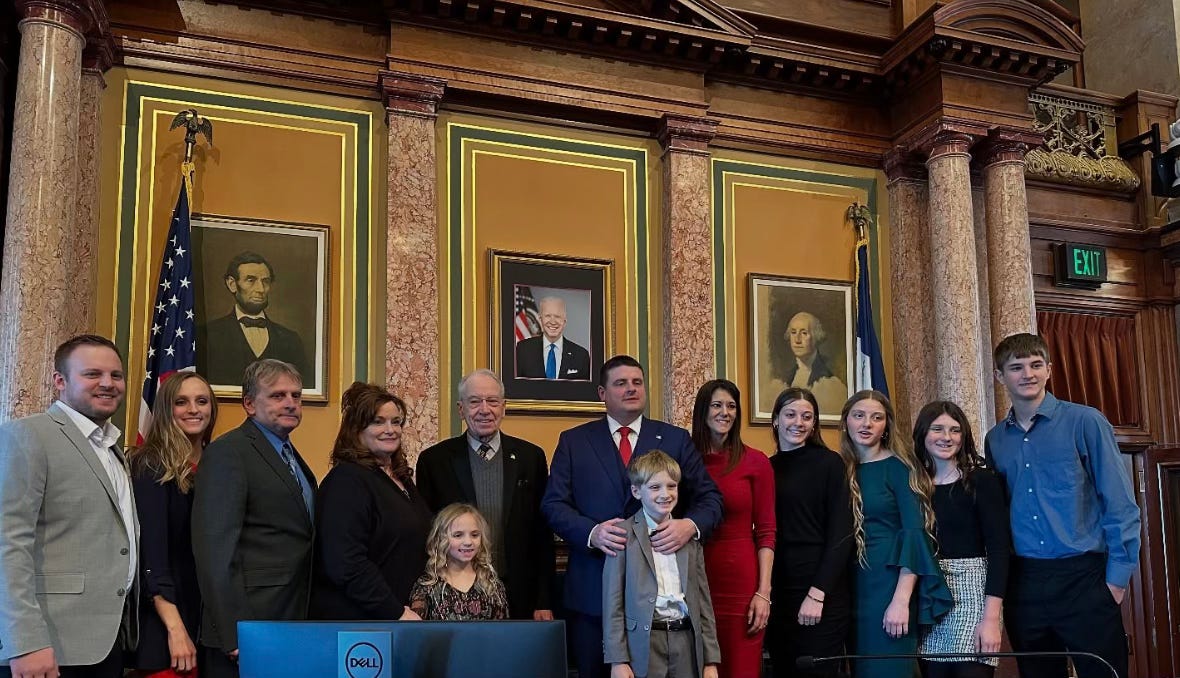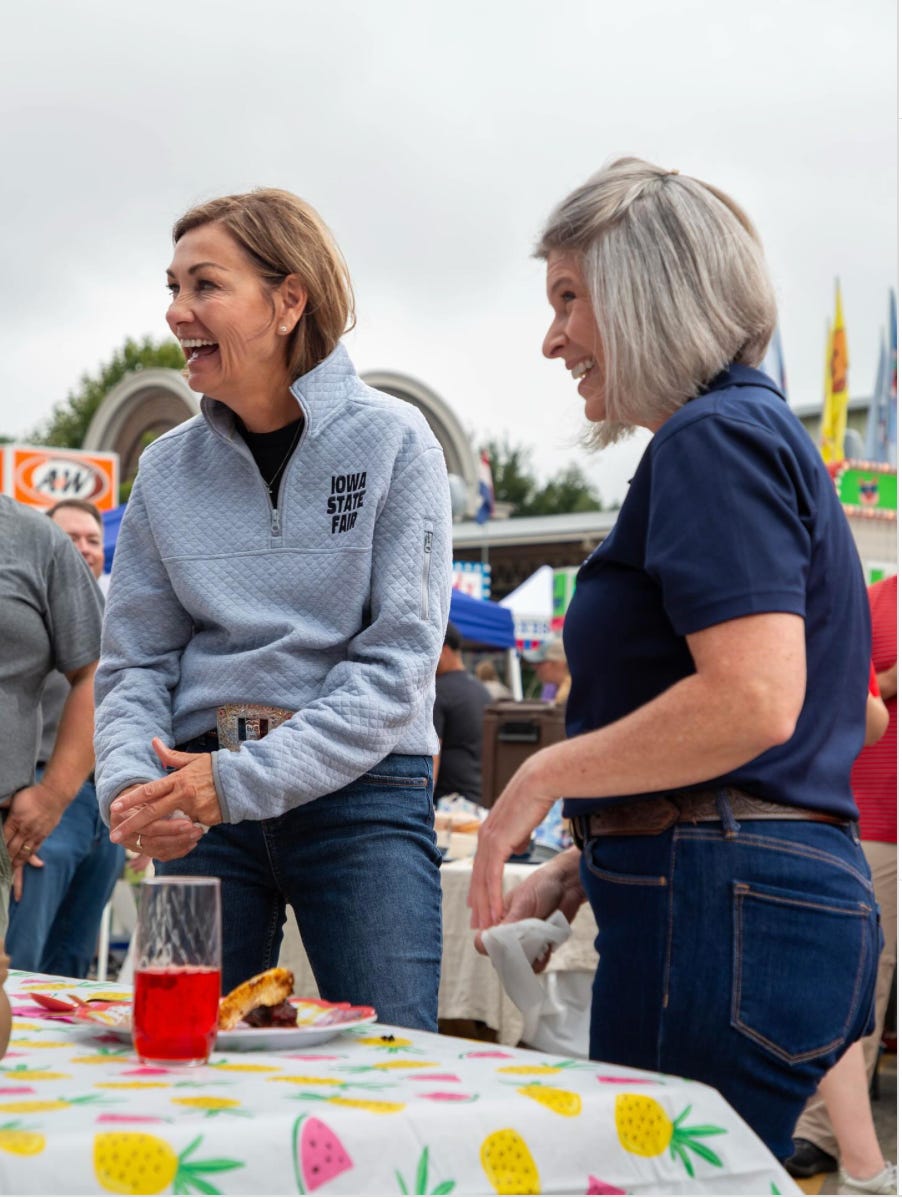Why Iowa's Conservative Women Are Stepping Back
Gov. Kim Reynolds and Sen. Joni Ernst step aside, opening the Gubernatorial and Senate campaigns
Iowa holds a special place in my heart.
For starters, it's where I got married. More than that, it’s a state where I grew up politically and witnessed something extraordinary in American politics. I've never seen a state so careful, so thorough, so healthily skeptical of power when someone wants to be President.
It's a journey I lived through with an unlikely candidate, Barack Obama, and one I hope the state will continue to play in Presidential politics moving forward.
This week, though, I'm intrigued by Iowa for a different reason: The state's pioneering conservative women leaders, Sen. Joni Ernst and Gov. Kim Reynolds, are stepping back, and I think their decisions say something important about the politics of the moment.
The Women Who Check Out, The Men Who Never Leave
Within months of each other, Iowa's two most prominent Republican women have announced they won't seek reelection. Sen. Ernst, after "tremendous prayer and reflection," wants to spend more time with family. Gov. Reynolds, citing similar family priorities, stepped aside after her husband's cancer diagnosis.
Both women cited family as their primary reason, and I believe them. But the timing — and the contrast with their male counterparts — tells a deeper story about how different leaders approach the question of when enough is enough.
Consider the contrast: Chuck Grassley, at 91, won reelection to his eighth Senate term in 2022, then immediately filed paperwork for a ninth term in 2028 — when he'll be 95 at election time and 101 when that term ends. Terry Branstad, Iowa's longest-serving governor in U.S. history, served from 1983-1999, then came back for another stint from 2011-2017 — a total of over 22 years across multiple decades.
These men seem to view politics as lifetime appointments, and family businesses.
Grassley's grandson, Pat, serves as Speaker of the Iowa House (and is viewed as an heir apparent to his seat), while one of Branstad's sons worked in the Trump administration. Ernst and Reynolds, meanwhile, in their 50s and 60s, both at the height of their political influence, are choosing to step back while they can still enjoy life after service (and without any of their offspring taking the reins).

This reminds me of something I said during the debate over whether California's Sen. Dianne Feinstein should remain in her seat during her final years: I'd rather be former California Sen. Barbara Boxer than Dianne Feinstein. Sen. Boxer left with dignity, time to enjoy her family, and a preserved legacy. Sen. Feinstein clung to power until the very end, diminished and unable to fully serve. Her legacy is tarnished.
Why more elected leaders don't opt for the Boxer model, I'll never understand. But Ernst and Reynolds are choosing it, and that's not weakness, I honestly think it's wisdom.
What's Really Happening in Iowa
Having worked with many conservative women throughout my career, I suspect there's more at play here than just family considerations. These women may be reading the political landscape with a clarity their male counterparts lack.
Iowa has shifted dramatically rightward in recent cycles. After Obama carried the state twice, Trump carried the state by 13 points in 2024. But since Reynolds faced historically low approval ratings, becoming the only governor with higher disapproval than approval numbers. Ernst has weathered criticism from both sides. Democrats lambasted her bleak Medicaid comments. (“Well, we all are going to die," she told a town hall about proposed Medicaid cuts.) Republicans grew frustrated over her initial hesitance on Defense Secretary Pete Hegseth's confirmation.
Perhaps these women recognize that Iowa's political environment has become more challenging, especially for female leaders who have driven the state to the right. Rather than fight losing battles or watch their legacies erode, they're making strategic exits while they can control the narrative.
Iowa as a Bellwether
This matters beyond Iowa because Iowa has often been a political trendsetter.
When Barack Obama carried Iowa in 2008, he went on to win Indiana and North Carolina — states we never thought we'd carry. It’s because we appealed to a middle America constituency to win the nomination. That's the power of Iowa momentum, and it's why I still believe Democrats should restore Iowa to an early position in the nomination process.

With both a Senate seat and the Governor's mansion open in 2026, Iowa could become competitive again. Just two weeks ago, Democrat Catelin Drey pulled off a stunning upset in a special election for Iowa State Senate, winning by 11 points in a district Trump carried by 10 points in 2024. Her victory broke the Republican supermajority in the Iowa Senate, part of a pattern of Democratic over-performance in Iowa special elections this year.
The women stepping back might or might not be because it will be a challenging election for them to win this time around, but it most definitely sets up an opportunity. Open seats are inherently more competitive than races against incumbents.
The Wisdom of Knowing When to Go
Ernst and Reynolds aren't retreating. To me they're demonstrating something their male colleagues seem incapable of: Knowing when you've accomplished what you set out to do.
Ernst is a female combat veteran who served in the Senate. She is also Iowa’s first female senator. Reynolds was the state’s first female governor and enacted sweeping conservative reforms. Both broke decades of male dominance in Iowa’s key offices.
They're leaving at the height of their influence, with their health intact, and time to enjoy the relationships they've sacrificed for public service. That's not giving up — that's winning differently.
THIS THURSDAY:
On Thursday I'll be continuing this conversation about Iowa and what's ahead with Iowa-based journalist Robert Leonard at 2 p.m. Pacific, 4 p.m. Central, 5 p.m. Eastern.
Robert is a contributor to The New York Times, The Kansas City Star, the Iowa Capital Dispatch, the Des Moines Register, TIME, FERN, USA Today, and many other publications. He covers rural issues, including politics, agriculture, immigration, food security, and climate change. He interviewed more than 8,000 Iowans for KNIA/KRLS, giving him unparalleled insight into how everyday Iowans think about politics and power.
Join us live and submit your questions in advance. Iowa's story isn't over — it might just be beginning a new chapter. And sometimes, knowing when to turn the page is the most important decision a leader can make.
What questions do you have about Iowa's political landscape? Submit them in the comments for Thursday's discussion.




I used to think Pat Grassley was the heir apparent to Chuck Grassley's seat, but I don't think that anymore. He hasn't done much to build up the statewide profile he would need, and I don't think he has his grandfather's work ethic. I see him possibly running for a statewide office in the future but not for the U.S. Senate.
I think Matt Whitaker will run for Grassley's Senate seat in 2028--if the senator retires, which is not a sure thing!
https://www.bleedingheartland.com/2025/08/23/chuck-grassley-not-ready-to-rule-out-ninth-term/
Interesting- just one suggested correction: Gov Reynolds is 66, not “in her 50s.”